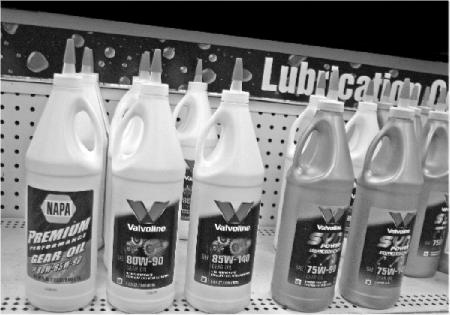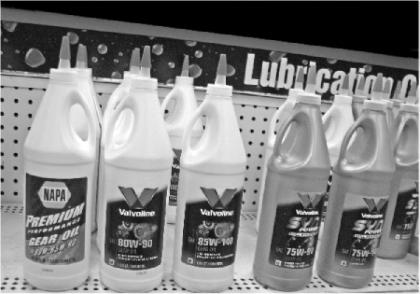



© 2026 - Macy’s Garage, Ltd.
Macy’s Garage

America’s BEST Triumph Shop
GEAR OIL
Triumph Gear Oil
What type of gear lube should I use in the differential? Some say to use GL-4 like in the transmission, but others say that GL-5 is O.K. since there is no brass in the rear end. The GL-4/GL-5 myth has been around for quite some time now, based on 1 part fact and 9 parts fiction, and perpetuated by those folks with loads of GL-4 to sell. Read through the following commentary that was submitted to the Triumph List (www.team.net) by a chemical engineer, working in the petroleum industry, and you’ll learn that GL-4/GL-5 are performance specifications, not manufacturing specifications, and do nothing to limit the amounts of compounds harmful to the soft metals in our Triumph gearboxes. From: Brad Jordan, Equilon Lubricants October 17, 2001 Subject: RE: Transmission/ Differential Oil At low pressure and temperatures, the viscosity of the fluid is what keeps the gear teeth apart and prevents wear. As the load and temperature increases, it becomes the job of the EP, or Extreme Pressure additives to minimize metal-to-metal contact. EP additives in lubricants chemically react under pressure and elevated temperatures with the metal in gears to form a protective film and prevent this metal-to-metal contact. EP additives are mostly made up of Chlorine, Sulfur, Phosphorous, Zinc and Lead compounds. Due to environmental concerns, Lead is for the most part gone and Chlorine is only used in limited applications. These compounds become active at different temperatures, and therefore, if balanced properly, provide protection at all operating temperatures. The problem in the past with some Sulfur EP additive packages in gear oils and yellow metals is not how much is in the oil, but that the additive breaks down and forms an acid. This acid, if formed, would eat up yellow metals and steel alike. The problem is the difference between what is called active and inactive Sulfur in the EP additive package. "Active" Sulfur compounds chemically react and form these protective films at much lower temperatures than "inactive" Sulfur EP additives. In some cases these "active" Sulfur additives may even stain the yellow metals in the gear sets. Whether a particular manufacturer uses active or inactive Sulfur EP agents is really only known by them. API, GL-4 and GL-5 are performance specs, not a formulation specs. Texaco Havoline gear oil 80w-90 and Shell Spirax HD 80w-90 are the right products for this application and do not stain yellow metals. We also have synthetic products in both brands, but the smallest quantity available is a 5-gallon bucket. Most major manufacturers have steered away from formulations with active sulfur EP additives to avoid staining yellow metals. In general, I would say the API GL-5 Multigear EP SAE 80w-90 lubricants marketed by Exxon-Mobil, Chevron, BP- Amoco, Castrol, Valvoline and Pennzoil would be safe for yellow metals. Also, well-known companies such as Redline, who specialize in motorcycle and sports car racing lubricants, would have products that don't stain yellow metals. I would stay away from the smaller little known companies that may be at trade shows selling "the greatest lubricants ever". The lubricants may perform extremely well in their table top bearing test against traditional motor oils, but they typically contain active Sulfur, Chlorine and other undesirable additives. As far as the difference between GL-4 and GL-5, API GL-4 rated lubricants do not have the EP level to withstand shock loading. Unlike API engine service classifications, API gear lubricant classifications are not required to meet the specs of lower classes and it all depends on the application. In the case of the Triumph, it probably recommends a GL-5, but even if it only recommends a GL-4, I would go with the GL-5 fluid. So there you have it. GL-4 and GL-5 designations tell us nothing about the active sulfur content of the oil, which is the ingredient that may damage the yellow metals in our gearboxes. It’s also interesting to note that GL-4 is not as capable of withstanding shock loading as GL-5 oils (for those of you who “drive ‘em like you stole ‘em”). Personally, I’ve been using synthetic gear oils in both my gearboxes and rear differentials for over 20 years now without a single problem. For those of you who are still suspicious of synthetic products, or who have not had your gearbox or rear diff. apart for a thorough cleaning, stick with major brands of GL-5, avoid the cheap stuff and the snake oil, and you’re TR gearboxes and differentials will be just fine.





© 2026 - Macy’s Garage, Ltd.
Macy’s Garage


America’s BEST Triumph Shop

Triumph Gear Oil
What type of gear lube should I use in the differential? Some say to use GL-4 like in the transmission, but others say that GL-5 is O.K. since there is no brass in the rear end. The GL-4/GL-5 myth has been around for quite some time now, based on 1 part fact and 9 parts fiction, and perpetuated by those with loads of GL-4 to sell. Read through the following commentary that was submitted to the Triumph List (www.team.net) by a chemical engineer, working in the petroleum industry, and you’ll learn that GL-4/GL-5 are performance specifications, not manufacturing specifications, and do nothing to limit the amounts of compounds harmful to the soft metals in our Triumph gearboxes. From: Brad Jordan, Equilon Lubricants October 17, 2001 Subject: RE: Transmission/ Differential Oil At low pressure and temperatures, the viscosity of the fluid is what keeps the gear teeth apart and prevents wear. As the load and temperature increases, it becomes the job of the EP, or Extreme Pressure additives to minimize metal-to-metal contact. EP additives in lubricants chemically react under pressure and elevated temperatures with the metal in gears to form a protective film and prevent this metal-to-metal contact. EP additives are mostly made up of Chlorine, Sulfur, Phosphorous, Zinc and Lead compounds. Due to environmental concerns, Lead is for the most part gone and Chlorine is only used in limited applications. These compounds become active at different temperatures, and therefore, if balanced properly, provide protection at all operating temperatures. The problem in the past with some Sulfur EP additive packages in gear oils and yellow metals is not how much is in the oil, but that the additive breaks down and forms an acid. This acid, if formed, would eat up yellow metals and steel alike. The problem is the difference between what is called active and inactive Sulfur in the EP additive package. "Active" Sulfur compounds chemically react and form these protective films at much lower temperatures than "inactive" Sulfur EP additives. In some cases these "active" Sulfur additives may even stain the yellow metals in the gear sets. Whether a particular manufacturer uses active or inactive Sulfur EP agents is really only known by them. API, GL-4 and GL-5 are performance specs, not a formulation specs. Texaco Havoline gear oil 80w-90 and Shell Spirax HD 80w- 90 are the right products for this application and do not stain yellow metals. We also have synthetic products in both brands, but the smallest quantity available is a 5-gallon bucket. Most major manufacturers have steered away from formulations with active sulfur EP additives to avoid staining yellow metals. In general, I would say the API GL-5 Multigear EP SAE 80w-90 lubricants marketed by Exxon- Mobil, Chevron, BP-Amoco, Castrol, Valvoline and Pennzoil would be safe for yellow metals. Also, well-known companies such as Redline, who specialize in motorcycle and sports car racing lubricants, would have products that don't stain yellow metals. I would stay away from the smaller little known companies that may be at trade shows selling "the greatest lubricants ever". The lubricants may perform extremely well in their table top bearing test against traditional motor oils, but they typically contain active Sulfur, Chlorine and other undesirable additives. As far as the difference between GL-4 and GL-5, API GL-4 rated lubricants do not have the EP level to withstand shock loading. Unlike API engine service classifications, API gear lubricant classifications are not required to meet the specs of lower classes and it all depends on the application. In the case of the Triumph, it probably recommends a GL-5, but even if it only recommends a GL-4, I would go with the GL-5 fluid. So there you have it. GL-4 and GL-5 designations tell us nothing about the active sulfur content of the oil, which is the ingredient that may damage the yellow metals in our gearboxes. It’s also interesting to note that GL-4 is not as capable of withstanding shock loading as GL-5 oils (for those of you who “drive ‘em like you stole ‘em”). Personally, I’ve been using synthetic gear oils in both my gearboxes and rear differentials for over 10 years now without a single problem. For those of you who are still suspicious of synthetic products, or who have not had your gearbox or rear diff. apart for a thorough cleaning, stick with major brands of GL-5, avoid the cheap stuff and the snake oil, and you’re TR gearboxes will be just fine.



















